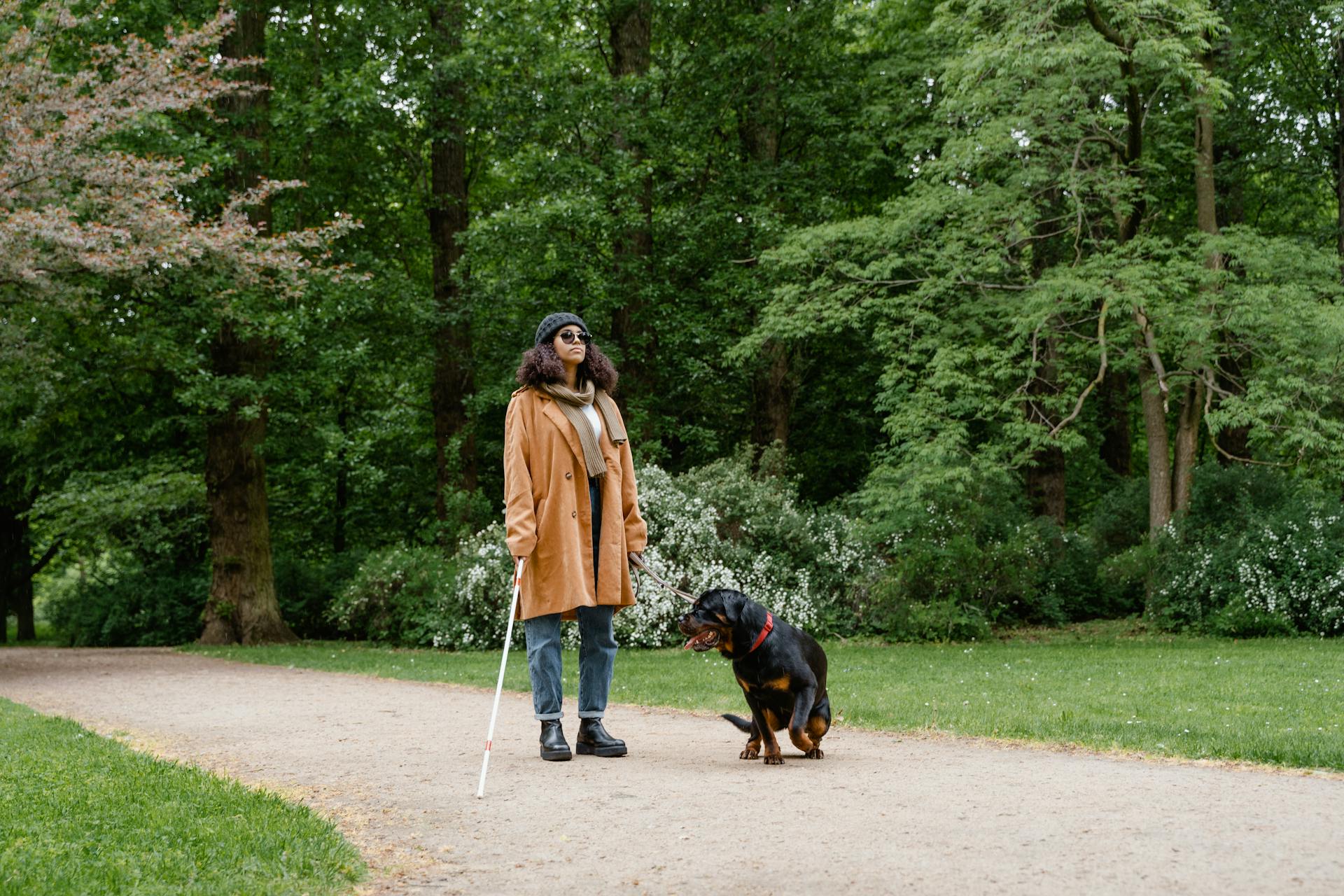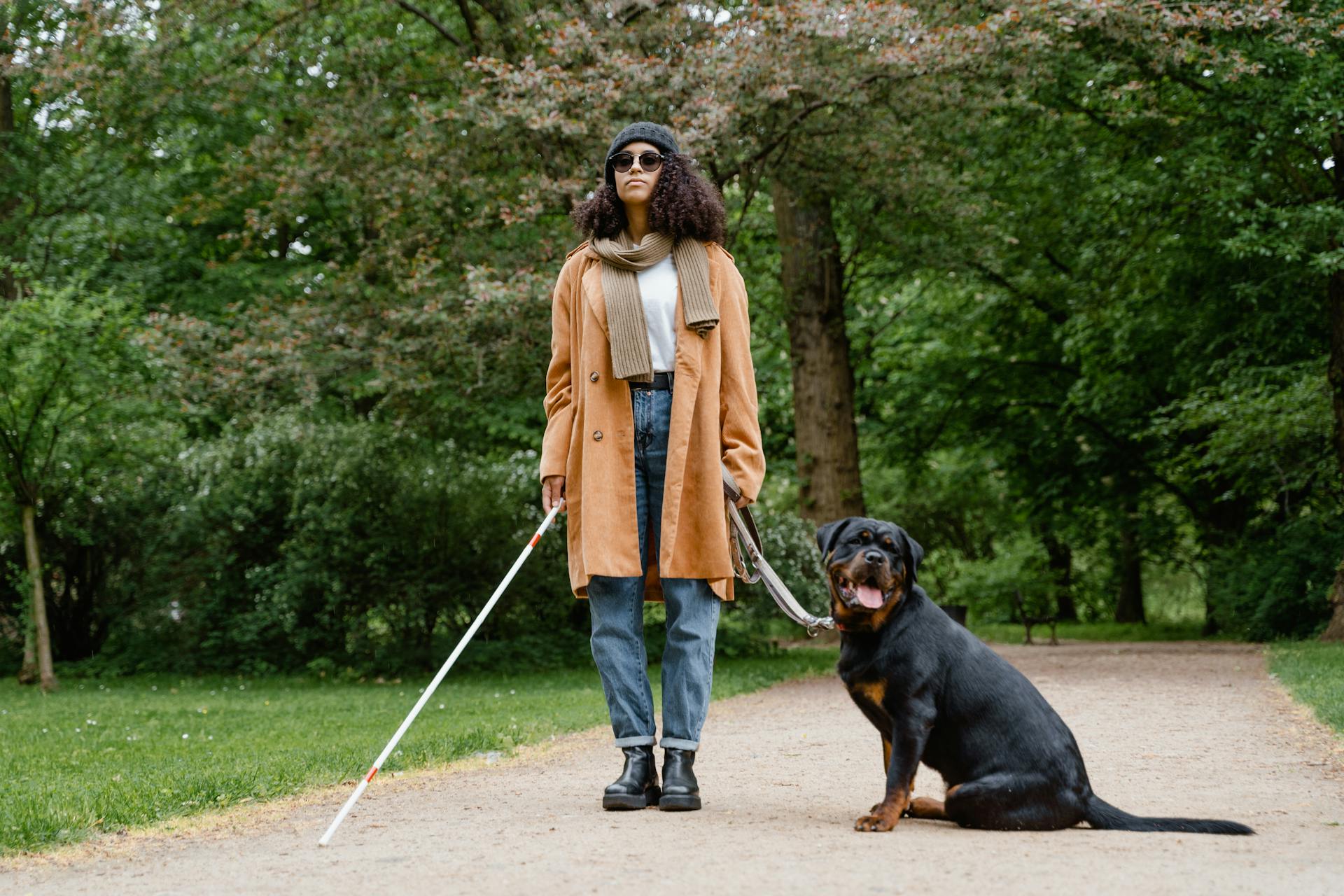
Mini Aussiedoodles can be prone to certain health issues due to their hybrid nature, and it's essential to be aware of these potential problems to provide the best possible care for your furry friend.
Hip dysplasia is a common issue in Aussiedoodles, as it can be inherited from the parent breeds, the Australian Shepherd and the Miniature Poodle. This condition can lead to arthritis and mobility problems if left untreated.
Regular exercise and a balanced diet can help prevent or manage hip dysplasia in Mini Aussiedoodles. A healthy weight and strong muscles can reduce the strain on their joints, making it a crucial aspect of their care.
Aussiedoodles are also at risk for eye problems, including cataracts and progressive retinal atrophy, which can cause vision loss and blindness. Regular eye exams can help detect these issues early on, allowing for prompt treatment.
Broaden your view: Preventative Care Keeping Your Pet Healthy Year-Round
Care and Maintenance
When it comes to eye care, Aussiedoodles are relatively low maintenance. Their fur should be trimmed to avoid blocking their vision.
Regular grooming is essential to prevent matting and tangling, which can lead to skin irritation and other issues.
Health and Wellness

Mini Aussiedoodles are generally healthy dogs with an average lifespan of 10 to 15 years. Proper care and nutrition are crucial to their longevity.
Their genetic diversity does come with some benefits, including a lower risk of certain health conditions. However, they can still be prone to issues passed down from their parent breeds.
Some potential health issues to be aware of include Sebaceous Adenitis, Cataracts, and Progressive Retinal Atrophy. These conditions can affect a dog's quality of life and may require veterinary attention.
Here are some common health issues that can affect Mini Aussiedoodles:
- Sebaceous Adenitis
- Cataracts
- Progressive Retinal Atrophy
- Hip Dysplasia
- Cushing’s Disease
- Pancreatitis
- Epilepsy
- Multiple Drug Sensitivity
Regular vet checkups and a healthy lifestyle can help prevent or manage these conditions.
Mini Puppies
Mini puppies require regular daily exercise to stay happy and healthy, so make sure to schedule playtime and outdoor activities into your daily routine.
They may not need as much exercise as a full-sized dog, but they still need physical stimulation to avoid behavioral problems.
Check this out: How Much Exercise Do Labrador Retrievers Need
If you're planning to bring a mini puppy home, be aware that they can become very dependent on your presence and anxious when left alone, so proper training from a young age is vital to avoid separation anxiety.
Their coat will require regular grooming due to their Poodle genetics, so be prepared for a high-maintenance beauty routine.
Their small size belies their energetic personality, so be prepared to keep up with their playful antics.
Additional reading: Why Do Yorkshire Terriers Lick so Much
Daily Routines
Daily routines are essential for the health and wellness of your Mini Aussiedoodle. They require daily exercise to stay happy and healthy, so plan for at least an hour of physical activity each day.
Their high energy levels and intelligence demand regular mental and physical stimulation. This can be achieved through activities like long walks, runs, or active playtime.
Mini Aussiedoodles need regular grooming due to their Poodle genetics, which can result in a high-maintenance coat. This requires regular grooming to prevent matting and tangling.
Establishing a consistent daily routine helps manage their protective nature and prevent excessive wariness or barking. Proper training from a young age is also vital to avoid behavioral problems like separation anxiety.
Here's a breakdown of their daily exercise needs:
Health
As a responsible dog owner, it's essential to be aware of the potential health issues that can affect your Aussiedoodle. On average, they can live between 10 and 15 years with proper care and nutrition.
Regular vet checkups are crucial to monitor your dog's health and catch any potential issues early on. A healthy lifestyle, including a balanced diet and regular exercise, can also help prevent or manage these conditions.
Some health issues that Aussiedoodles are prone to include hip dysplasia, which can cause pain and arthritis if left untreated. Joint dysplasia can be caused by a malformed joint, and mild cases can be treated with exercise, a healthy diet, and maintaining a healthy weight.
Aussiedoodles can also be affected by eye problems, such as cataracts and progressive retinal atrophy. Regular eye care, including trimming their fur to prevent blockage, can help prevent these issues.
Here are some potential health issues that Aussiedoodles may face:
- Sebaceous Adenitis
- Cataracts
- Progressive Retinal Atrophy
- Hip Dysplasia
- Cushing’s Disease
- Pancreatitis
- Epilepsy
- Multiple Drug Sensitivity
It's essential to be aware of these potential issues and work with a reputable breeder who screens the health of their dogs. Regular checkups and a healthy lifestyle can help prevent or manage these conditions, ensuring your Aussiedoodle lives a happy and healthy life.
Curious to learn more? Check out: Healthy Pet Wellness Center
Bloat
Bloat is a serious condition that can affect our furry friends, especially large and deep-chested breeds like Poodles and possibly their crossbreeds, such as standard Aussiedoodles.
If you notice your dog is restless, take action immediately.
Excessive drooling is another sign of bloat, so keep an eye out for that too.
Retching or attempting to vomit, panting, and a distended stomach are all warning signs that something's wrong.
A collapsed dog is a clear indication that they're in distress and need medical attention right away.
Some common signs of bloat include:
- Restlessness
- Excessive drooling
- Retching or attempting to vomit
- Panting
- Distended stomach
- Collapse
If you notice any of these symptoms, don't hesitate to take your dog to the vet immediately.
Bloat and gastric-dilation volvulus (GDV) are serious conditions that can be fatal if left untreated.
Home Environment Adaptation
Creating a healthy environment for your Aussiedoodle is crucial for their well-being. Regular cleaning is essential to reduce allergen levels in your home.
Using a vacuum with a HEPA filter is a great way to capture pet dander, which can be a significant allergen contributor. This simple habit can make a big difference in maintaining a healthy environment.
Air quality is also an important consideration. An air purifier can be a valuable addition to your home, keeping the air clean and free from allergens.
To minimize places where hair and dander can accumulate, keep your living space free from clutter. This will help create a healthier environment for your Aussiedoodle to thrive.
For more insights, see: Free Vaccination Clinic for Dogs
Coat Types and Grooming
The coat type of a Mini Aussiedoodle affects its grooming needs. Understanding these varieties and the appropriate grooming practices is essential for maintaining the dog's health and appearance.
Mini Aussiedoodles can have a range of coat types, from curly and Poodle-like to wavy coats. Those with curlier coats require more frequent brushing and professional grooming every 6-8 weeks to prevent matting.
Aussiedoodles with wavy coats might need less intense grooming, but still benefit from regular brushing. Regular nail trims, ear cleaning, and dental care are essential for all Aussiedoodles, regardless of coat type.
Poodles are known to have skin issues, and Aussiedoodles may inherit this trait. Aussiedoodle parents need to keep an eye out for symptoms of sebaceous adenitis, such as excessive flaking, scaling, or thickening of the skin.
After a dip in the water or a bath, Aussiedoodles need their ears cleaned with a dog-specific cleaner to prevent moisture from becoming trapped and leading to ear infections. Regular ear cleaning is crucial for maintaining ear health.
Take a look at this: Do Pit Bulls Need a Lot of Exercise
Feeding Right
A high-quality diet is essential for maintaining the health and energy levels of a Mini Aussiedoodle.
To prevent obesity and related health issues, monitor your dog's food intake and adjust as needed.
Full-grown Mini Aussiedoodles should be fed two meals a day, while puppies need to eat more frequently, between three and four times a day on a consistent schedule.
Consult with your veterinarian to determine the best feeding schedule and type of food for your Mini Aussiedoodle based on their size, age, and activity level.
A well-balanced diet that meets the nutritional needs of an active dog is crucial for your Mini Aussiedoodle's overall health and well-being.
The dog food packaging will give guidance on how much to feed your dog based on weight, but speaking to your veterinarian about portions is the best way to keep your pup healthy.
Active dogs need food that meets all of the nutritional needs set out by the Pet Food Institute, including vitamins like Vitamin A and D3, as well as proteins and fats.
To minimize risk of bloat, make sure your dog doesn't ingest too much food or water too quickly.
Health Issues and Concerns
Mini Aussiedoodles are generally a healthy breed, but like any dog, they can be prone to certain health issues. On average, they have a lifespan of between 10 and 15 years.
Proper care and nutrition are crucial to their longevity, but even with a healthy lifestyle, issues can still arise. Genetic diversity in Mini Aussiedoodles can lower their risk of some health conditions, but they can still inherit issues from their parent breeds.
Some common health concerns in Mini Aussiedoodles include Hip Dysplasia, Progressive Retinal Atrophy (PRA), Epilepsy, and Pancreatitis. Early detection and treatment can help manage these conditions. Here are some specific health issues to be aware of:
- Hip Dysplasia: a malformation of the hip joint leading to pain and arthritis
- Progressive Retinal Atrophy (PRA): a genetic condition that can cause blindness
- Epilepsy: a neurological disorder that can lead to seizures
- Pancreatitis: inflammation of the pancreas, which can cause symptoms like vomiting and lethargy
Regular vet checkups and a healthy lifestyle can help prevent or manage these conditions.
Common Concerns
As you consider bringing an Aussiedoodle into your family, it's essential to be aware of the potential health concerns that can arise. Hip Dysplasia is a common issue in many dog breeds, including Aussiedoodles, causing pain and arthritis if not managed properly.
Regular eye check-ups are crucial for Aussiedoodles, as they can inherit a predisposition to Progressive Retinal Atrophy (PRA), a degenerative eye condition that can lead to blindness. Early detection can help manage this condition, although there is currently no cure.
Cataracts can also affect Aussiedoodles, causing the eye's lens to become cloudy and impairing vision. Surgery may be required in severe cases to restore sight.
Epilepsy is another neurological condition that can affect Aussiedoodles, causing seizures. Managing this condition often involves working with a veterinarian to develop a plan.
Aussiedoodles can also be prone to skin allergies, which can be triggered by various environmental factors, food, or even grooming products. Managing these allergies often involves identifying and avoiding triggers.
Here are some common health concerns that can affect Aussiedoodles:
- Hip Dysplasia: A malformation of the hip joint leading to pain and arthritis.
- Progressive Retinal Atrophy (PRA): A genetic condition that can cause blindness.
- Epilepsy: A neurological disorder that can lead to seizures.
- Cataracts: A condition that can cause the eye's lens to become cloudy and impair vision.
- Patellar Luxation: Displacement of the kneecap causing lameness or irregular gait.
Early detection and treatment can help manage these conditions, so it's essential to work closely with a veterinarian to ensure your Aussiedoodle stays healthy and happy.
Allergies
Allergies can be a real challenge for some Australian Shepherds and mini Aussies, particularly those suffering from chronic flea allergies. These dogs may experience excessively dry skin.
Some breeds are more prone to flea allergies, and in these cases, using a combination of treatments like Program with a topical flea preventive can be beneficial.
Ivermectin sensitivity is another issue to be aware of, as it can be toxic to some dogs, especially those from Australian Shepherd and mini Aussie lines. Symptoms of ivermectin toxicity include depression, excitability, and seizures.
For more insights, see: American Bully Food Allergies
Maximizing Longevity and Quality of Life

To promote a long, healthy life for a Mini Aussiedoodle, they require a balanced diet tailored to their life stage, size, and activity level.
Regular physical activity is essential to maintain a healthy weight and muscle tone. A daily walk or playtime can go a long way in keeping your Mini Aussiedoodle happy and healthy.
Routine veterinary check-ups and timely vaccinations are also key to preventing health issues. By following a preventive health care schedule recommended by your vet, you can help your Mini Aussiedoodle live a long and healthy life.
Maximizing Longevity
To maximize longevity, it's essential to focus on a balanced diet tailored to your Mini Aussiedoodle's life stage, size, and activity level. This will ensure they receive the necessary nutrients for optimal health.
A regular physical activity routine is also crucial to maintain a healthy weight and muscle tone. This can be achieved through daily walks, playtime, and other fun exercises.
Routine veterinary check-ups and timely vaccinations are key to preventing illnesses and detecting potential health issues early on. By following a preventive health care schedule recommended by your vet, you can help your Mini Aussiedoodle live a long and healthy life.
Here's a summary of the essential care elements:
- Diet: A balanced diet tailored to their life stage, size, and activity level.
- Exercise: Regular physical activity to maintain a healthy weight and muscle tone.
- Routine veterinary check-ups and timely vaccinations.
Can Dogs Thrive in Different Environments?
Can dogs thrive in different environments? The answer is yes, but it depends on the breed and individual dog. Aussiedoodles, for example, can adapt to various living situations, including apartments, as long as they receive adequate exercise and mental stimulation.
They do best in homes where they can be close to their families, as they thrive on human companionship. A securely fenced yard is ideal for safe play and exercise, but it's not absolutely necessary if the owner is committed to providing regular outdoor activities.
Some dogs, like Aussiedoodles, are not well-suited for being left alone for extended periods, as they can develop separation anxiety. This means owners need to make time for their dogs and provide them with attention and interaction throughout the day.
A fresh viewpoint: How Much Exercise Does a Cavapoo Need
Frequently Asked Questions
What is the lifespan of a mini Aussiedoodle?
Mini Aussiedoodles typically live 14-15 years, but some have been known to live up to 16 years or more with proper care. Regular vet checks and high-quality food can help ensure your mini Aussiedoodle lives a long and healthy life.
Featured Images: pexels.com


